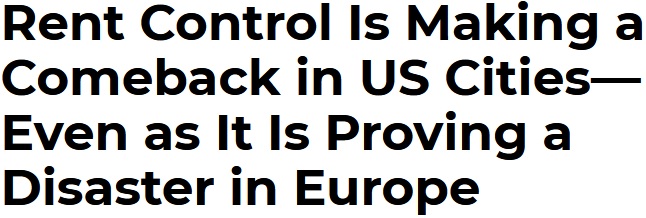November 14, 2021 by Dan Mitchell @ International Literacy
There are some issues – such as class-warfare tax rates and the minimum wage – where intelligent people on the left will privately admit being wrong (or at least they will admit adverse consequences).
Another example is rent control.
Indeed, it’s so obvious that imposing price controls on housing will create shortages that some folks on the left even admit publicly that it’s a bad idea. Yet leftist politicians are drawn to the policy for the simple reason that renters outnumber landlords. Simply stated, they’re willing to impose considerable damage so long as they can grab a few extra votes.
Let’s look at some evidence about the folly of rent control, and we’ll start with a hot-off-the-presses column by Ryan Mills for National Review.
Democratic leaders in Minnesota’s capital city are scrambling for solutions after developers put several large projects on hold across St. Paul in the wake of last week’s election, when residents approved what may be the strictest rent-control policy in the country. …left-wing activists on the eastern bank of the Mississippi River succeeded in their effort to cap rent increases at 3 percent annually, including on new construction, a step most communities that have imposed rent-control policies have specifically avoided out of concern that it would discourage future investments. The St. Paul initiative passed last week with 53 percent support. …Large developers who spoke to the Minneapolis Star Tribune and the St. Paul Pioneer Press told reporters that they’re pausing their projects across the city, and they are “re-evaluating what – if any – future business we’ll be doing in St. Paul.” Lenders are pulling out of new projects, they say, worried about the impact of the new policy. …dozens of buildings…have had 2022 rehabilitation projects stopped.
Wow. Sounds like St. Paul wants to supplant Minneapolis as the worst-governed city in the state. Speaking of poorly governed cities, Christian Britschgi of Reason wrote early last year about what’s happening with rent control in New York City.
When the New York legislature passed major changes to the state’s rent regulations in June 2019, critics warned the new law would reduce investment in, and renovations of, rental properties in New York City. …those predictions are bearing out. …sales of apartment buildings in the Big Apple fell by 36 percent in 2019, and…the money spent on those sales fell by 40 percent. The prices investors were paying for rent-stabilized units—where allowable rent increases are set by the government and usually capped at around 1 or 2 percent per year—fell by 7 percent. …69 percent of building owners have cut their spending on apartment upgrades by more than 75 percent since the passage of the state’s rent regulations. Another 11 percent of the landlords in the survey decreased investments in their properties by more than 50 percent.
Some European cities also have adopted price controls on housing. In a column for the Foundation for Economic Education, Jon Miltimore explains the damage this approach has caused in Stockholm.
Stockholm is just one of many Swedish cities struggling with a housing shortage. It’s not just that prices are too high; wait times for flats are also stunningly long. In Stockholm, for example, the average waiting time for a typical property is about nine years…, but wait-time in Stockholm’s most attractive neighbourhoods can run double that. …For younger Swedes in particular, the housing situation is a real problem—and it stems from Sweden’s decades-long embrace of rent control policies, which stretch back to World War II. …the results of Sweden’s rent control policies were quite predictable. The reality is price controls and other government regulations can’t fix housing problems.
The mess in Stockholm has even attracted attention from the BBC, as illustrated by the excerpt in this tweet. Jon Miltimore also wrote about disastrous impact of rent control in Berlin.
In February 2020, Berlin introduced the so-called Mietendeckel—a cap on rent—to keep Berlin from becoming the next London or New York, cities where pricey rents have driven out many lower- and middle-class residents. The rent caps didn’t apply to everyone, however. They applied to properties built prior to 2014, freezing rent at June 18, 2019 levels. …Well, a year later, and the results of Berlin’s experiment are in. …Housing supply has shrunk and many landlords have reportedly exited the market, making the shortage much worse. …The lesson? Rent control has effects on housing supply, and those effects are not good.
And it you want more bad news from Germany, Berlin voters just approved a scheme to confiscate some apartments. Here’s the story from the EU Observer.
Berliners voted in favour of expropriating apartments owned by big real-estate companies, with 56 percent of voters in the German capital saying ‘yes’ in the non-binding referendum at this weekend, the Financial Times reported on Monday. Now Berlin’s new municipal government has to decide how to proceed, since the expropriation of housing units could be legally challenged as against the German constitution.
I don’t know the outcome (if any) of the court challenge, but I do know that rent control is horrible policy. And other economists agree.
P.S. Price controls are also bad news for pharmaceutical products and emergency supplies.



No comments:
Post a Comment